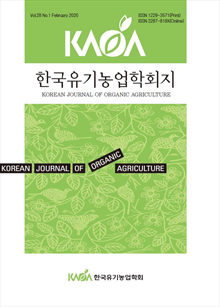간행물
한국유기농업학회지 KCI 등재 Korea Journal of Organic Agriculture

- 발행기관 한국유기농업학회
- 자료유형 학술지
- 간기 계간
- ISSN 1229-3571 (Print)2287-819X (Online)
- 수록기간 1992 ~ 2020
- 주제분류 농수해양 > 농학 농수해양 분류의 다른 간행물
- 십진분류KDC 523DDC 630
권호리스트/논문검색
Vol.16 No.2 (2008년 6월) 5건
1.
2008.06
서비스 종료(열람 제한)
The objective of this paper is to evaluate the feasibility of exporting Korean organic agricultural products to Japanese market. To achieve the objective, we explored the marketing trend of organic agricultural products in Japan and surveyed marketing dealers and food processors that deal with organic foods. We also analyzed Korean farmers" intention of acquiring organic Japanese Agricultural Standard(JAS) certificate in order to export organic agricultural products. The results show that mini tomato is economically feasible to acquire organic JAS certificate but other agricultural products need more attentions. The results also suggest that the education of production and safety management using the international standards such as Japanese Agricultural Standard should be strengthened by local government to promote export of organic agricultural products. The paper implies that producers acquiring organic Japanese Agricultural Standard should be systematization to get larger scale and to guarantee the stability in export supply.
2.
2008.06
서비스 종료(열람 제한)
This study focused on production and distribution situations of Korean organic beef cattle at Hongseong Chungnam. Case Farmers have raised cattle organically based on interchange between a few Consumers" Life Cooperatives(CLC) and them. CLC furnished with funding to purchase calves and bought the cattle beef. However, they have many problems related to procuring organic feed in producing organic beef. Presently, they have used organic byproducts from sowing farming and prepared grass places. But they don"t breed organic beef cattle in a large scale because of the limitation of organic feed output.
3.
2008.06
서비스 종료(열람 제한)
The objective of this paper is to analyze consumers" consumption behavior of environment-friendly mandarin and attributes of mandarin in Korea. It is also to measure consumers" marginal willingness to pay by the attributes of mandarin and to estimate the market-share by products of mandarin from the data surveyed by a survey research company. The questionnaires for consumers were given randomly by interview to 500 married women lived in Seoul and to 200 wholesaler in Seoul, Busan, Daegu, Kwangju. The conjoint analysis method was used to analyze consumers" preference and suggest several implications for the rational production and marketing policy of mandarin.
4.
2008.06
서비스 종료(열람 제한)
This study was conducted to evaluate the effects of dietary pitamin, pine bark extracts, as a organic livestock feed additives on the egg production and egg quality of laying hens. One hundred-fifty laying hens (Hyline brown) were randomly allocated to one of the following 3 treatment groups for 6 weeks: control, pitamin 0.1% and pitamin 0.2%. The egg production of hens fed the diet containing 0.1% pitamin was similar to that of the control; however, the egg production of the pitamin 0.2% group was significantly lower than that of the other groups (p
5.
2008.06
서비스 종료(열람 제한)
This trial was conducted to assess effects of cattle slurry application on productivity and feed values of barley and hairy vetch when they were influenced by single or mixed-sowed cultivation in paddy fields, and to obtain good quality of organic forage resources. The results summarized are as follows. For barley and hairy vetch, single-sowed cultivation was lower in annual dry matter (DM) and total digestible nutrients (TDN) yields than mixed-sowed (P

